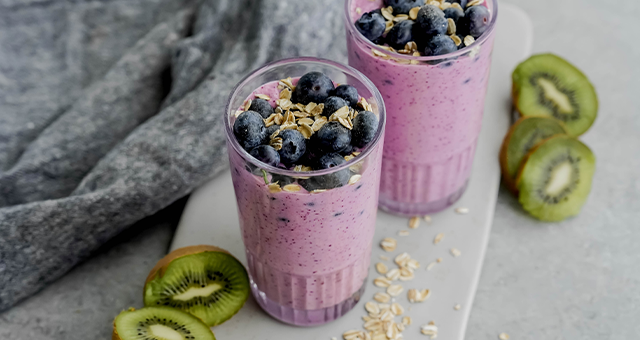The health of our microbiome is affected by many factors, including what we eat each day. Like probiotics, consuming foods rich in prebiotic fiber (a.k.a. prebiotics) plays a special role in the health of our gut and body. Prebiotics are the food for necessary probiotic cultures (good, live bacteria) that we depend on for a healthy microbiome.

Everything You Need to Know About Prebiotics (Fiber):
Prebiotics are natural properties within certain foods that are utilized by microorganisms that we know as probiotics (good cultures). These prebiotics help benefit your gut health and overall health as defined by the International Scientific Association for Probiotics and Prebiotics. In simpler terms, they are certain types of soluble fiber (a fiber that dissolves in water: think oats, beans, potatoes, etc.) that fuel the healthy, beneficial microbes in our gut, which positively impacts the growth of beneficial bacteria and their ability to produce benefits.
It’s important to know that while prebiotics are a type of fiber, not all fibers are prebiotics. They are found in many foods you already know and love and may be in certain supplements. Some of the most commonly studied prebiotics that are used in supplements and found naturally in foods are inulin, fructooligosaccharides (FOS), galactooligosaccharides (GOS), and human milk oligosaccharides (HOS).

Benefits of Prebiotic Fiber:
Prebiotics are non-digestible fibers, meaning they are not digested by the body, but instead by the bacteria (probiotics) in our gut. When our gut microbes (good bacteria) ferment or digest the prebiotics, they encourage the growth of beneficial bacteria as well as produce a variety of important compounds, including short-chain fatty acids (SCFAs). SCFAs feed the good bacteria in our gut and help our guts thrive at a maximum level.
Around 95% of these SCFAs are absorbed by the body where they are put to work, and 5-10% stay in the gut where they help create an acidic environment that helps fight pathogens and improves mineral absorption. SCFAs, one of which is referred to as butyrate, also help with mucus production and improve intestinal barrier function. This forms a protective barrier against disease and helps regulate immunity to reduce inflammation in the body. Physiological benefits of SCFAs include blood sugar regulation, management of blood lipid levels, promotion of digestive health, and regulation of satiety.

What Foods Are High in Prebiotic Fiber?
Prebiotics can be found in common including fruits, vegetables, whole grains, beans, nuts, and seeds. Vegetables include leeks, onions, garlic, asparagus, artichokes, potatoes, squash, broccoli, and cauliflower. Whole grains include oats, barley, wheat and wheat bran, sorghum, and millet are others, although there are many more. Legumes including peas, beans, and lentils are also high in prebiotic fiber. Fruits that are high in prebiotics include berries, apples, cherries, bananas, kiwi, peaches, plums, figs, and dates. Nuts and seeds that offer prebiotic fiber include pistachios, cashews, walnuts, flax seeds, and chia seeds.
Some packaged foods may contain prebiotic fiber as an additive in the form of galactooligosaccharides, fructooligosaccharides, oligofructose, chicory fiber, or inulin. You may also see these on some supplements.
It’s important to remember to include both probiotic foods and prebiotic foods in your diet to benefit the microbiome and overall health. In fact, a landmark study showed that subjects who ate fermented foods had more gut diversity and lower inflammation markers than those who consumed a high-fiber diet alone.

Fermented foods, such as Lifeway’s products provide probiotics to support our gut bacteria. When consumed along with prebiotics at the same time, whether in a recipe or product, this is called a synbiotic. This is a double benefit that can help in many ways. Lifeway’s kefir’s probiotics supports the growth of all these beneficial prebiotics so your gut can thrive and reproduce the bacteria it needs to keep you healthy. Be sure to check out all our favorite recipes with Lifeway kefir or our farmer cheese to see which ones your tummy might enjoy today!